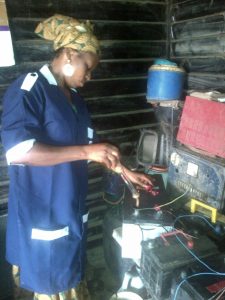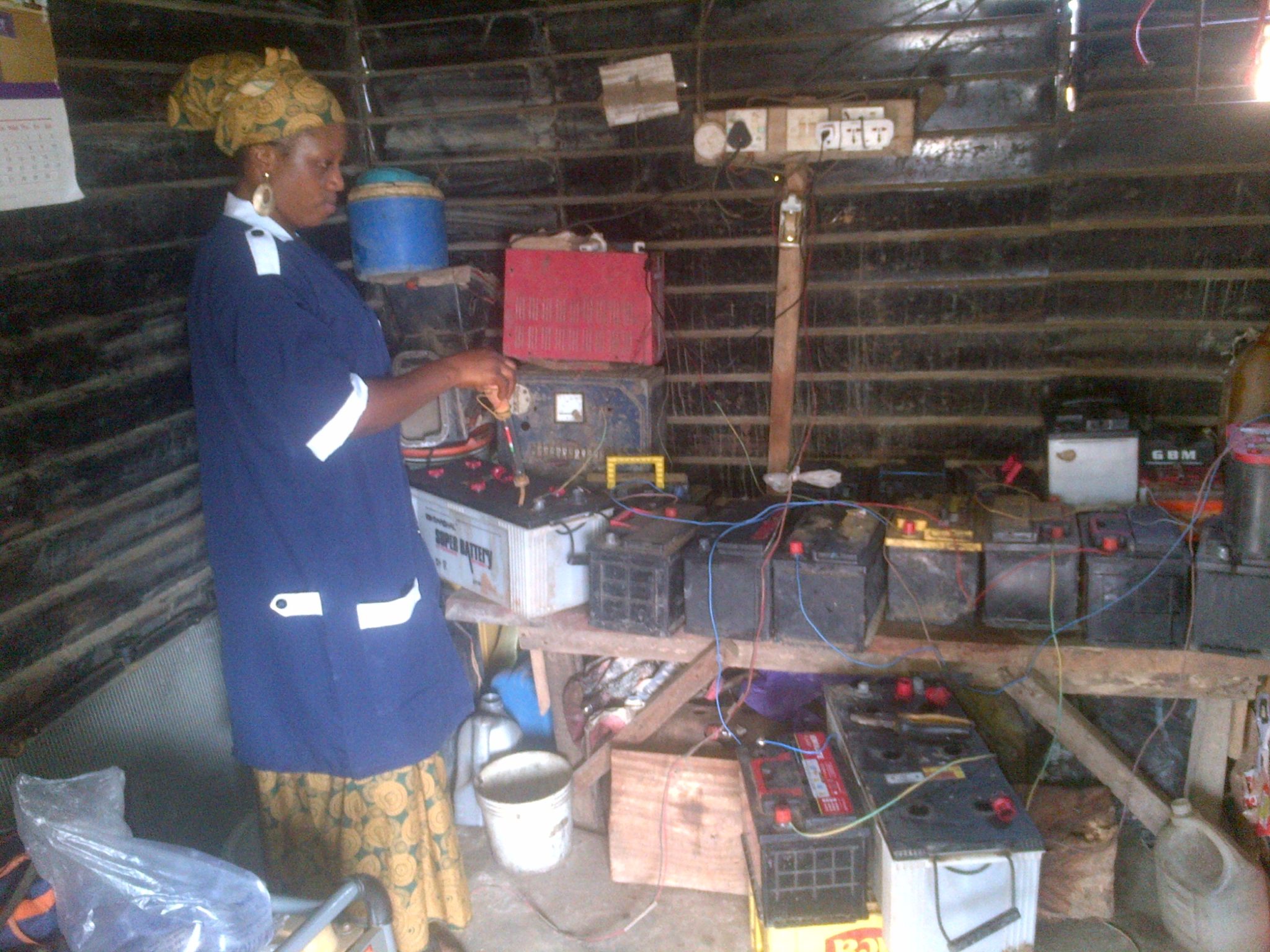From time immemorial, some professions or vocations have been marked as the exclusives of one of the two sexes – male and female. In Nigeria, for instance, for many a girl, who for one reason or the other are unable to further their education after secondary school, the obvious choices of vocation are hairdressing, tailoring and trading among others.
However, the situation is fast changing today as many girls are venturing into the vocation otherwise considered to be for the male. Among other things, it is no longer a rarity to have a woman making a living as a bus driver, conductor or even mechanic.
Forced by the poor economic reality in the country or the need to be different, some ladies are today in jobs that are termed to be men’s.
One of such women is Oriyomi Lawal, mother of three, who works as a professional battery charger. Although she refers to herself as Doctor of Batteries, she is popularly known as “Woman Charger” among her colleagues.
Spotting a yellow ankara (African print) skirt and blouse with a touch of grey designs, and a blue “battery chargers” association’s uniform over it, when our reporter visited her, she appeared smart and carried herself with some amount of respect.
For Oriyomi, the decision to become a “battery charger” was informed by the need to be different from all. According to her, when she finished her secondary school education at Community Secondary School, Mushin in Lagos State in the year, 2000, she lost her father, Mr. Oladipo Soliu, thus foreclosing any ambition to further her education for lack of the financial wherewithal.

She said, left with the option of learning a trade, many, including her mother, had thought she would join the bandwagon by learning to be a fashion designer or hair-dresser, but she dared to be different.
Against their expectations, she opted for a job that is considered the exclusive of men – Battery charging. Perhaps one thing that also aided her ambition was her boss, who, is also a woman – Madam Fatimo – Feyintola who lived in the neighbourhood.
“When I finished my secondary school, I wish I could further my education, but that was the year that my father died. That put a stop to that ambition because of the financial state of my mother. I was left with no choice but to learn a trade. Suggestions were made to the effect that I should go for fashion designing or any such trade known to be for women, but I declined.
“When I told my mother and others that my choice was battery charging, they were surprised. They felt that I could not be serious, but when I insisted, I was enrolled and started the training at Alaba Street in Mushin Lagos. My boss is Madam Fatimo Feyintola”, she said.
Oriyomi spent four years as an apprentice and that enabled her “to know the in and out of battery charging”.
She said she could have spent just two years, but because she was still single and young, she felt it would not be a bad idea if she added more to her years of apprenticeship to increase her knowledge.
Upon completion of apprenticeship in 2004, she set up her own shop at Alafiatayo Street, Mushin, where she practised. She was to leave Mushin, after a year. Reason: She got married and had to relocate with her husband, Mr. Afeez Lawal, to Atan Ota. In 2007, she opened another shop by the roadside at Atan market, where she not only charges and repairs batteries, but sells batteries too.
But how has it been for her being a woman in a job believed to be meant for men?
“I feel good. To me, I don’t feel any different. It is normal, but people are always surprised when they find out that the battery charger attending to them is a woman instead of a man”, she said.
Oriyomi told the story of a female broadcaster who drove into the filling station near her shop and after fuelling her car could not start the engine as a result of a flat battery.
The woman sought for a battery charger to help out and behold, the person brought in was a female.

Oriyomi Lawal, the female battery charger
“When I got there, the woman asked the person that came to call me ‘where is the battery charger’and the man pointed to me. She could not believe her eyes and stood amazed as I fixed the problem,” she said.
The female broadcaster was not alone in her amazement, Oriyomi stated. Many other people had expressed the same feeling and told her that she was the first female battery charger they had seen.
Her peculiarity had favoured her in different ways. She said at times, when fixing a problem, some of her clients gave her extra money as compliment for daring to veer into a trade that is meant for men.
Although she did not say that her peculiarity as a female battery charger attracted her to her husband, Oriyomi said she met her husband when she went to fix a battery problem, somewhere in Mushin.
She said that appreciative of her skill and dedication to work, her husband has been her pillar of support.
Oriyomi has no regret choosing to be a “battery charger”. On a good day, she told our reporter, she makes N10,000 and N5,000 some other days. That, however, is apart from the sale of batteries. She pointed out that when there is good sale of batteries, she could make as much as N100,000.
She explained that money also comes in in the area of training. She told our reporter that at present, she had three apprentices – two boys and one girl. And obviously, the training is not free.
Stressing how lucrative the business is, she said with proceeds from it, she had been able to build a house of her own.
Lest she be misunderstood, she said success in the business is not automatic. According to her, “it takes determination, doggedness and good business sense, to succeed.”
Oriyomi spoke on what it costs to train as a battery charger. She said apart from the interest and determination, an apprentice would be required to pay a fee of N40,000 and make available some snacks, drinks and spirit. And for the graduation, the apprentice would pay N20,000 and provide food and drinks.
She explained that for those who might not want to celebrate the graduation the usual way, a fee of N50,000 would be charged and the certificate would be issued.
These are different from what the situations were when she was an apprentice. During her time, training fee was just N5,000 while for the graduation she paid N20,000 and provided food and drinks for the graduation.
Oriyomi said being a woman had not denied her anything. She said she was highly rated among the male folk in her zone of the Association of Battery Chargers of Nigeria where she is the Secretary.
The peculiarity of her state as a female battery charger is underscored in the fact that only two of them exist in Ogun State, according to her. She said apart from her, the other person is located in Ijebu Ode.











